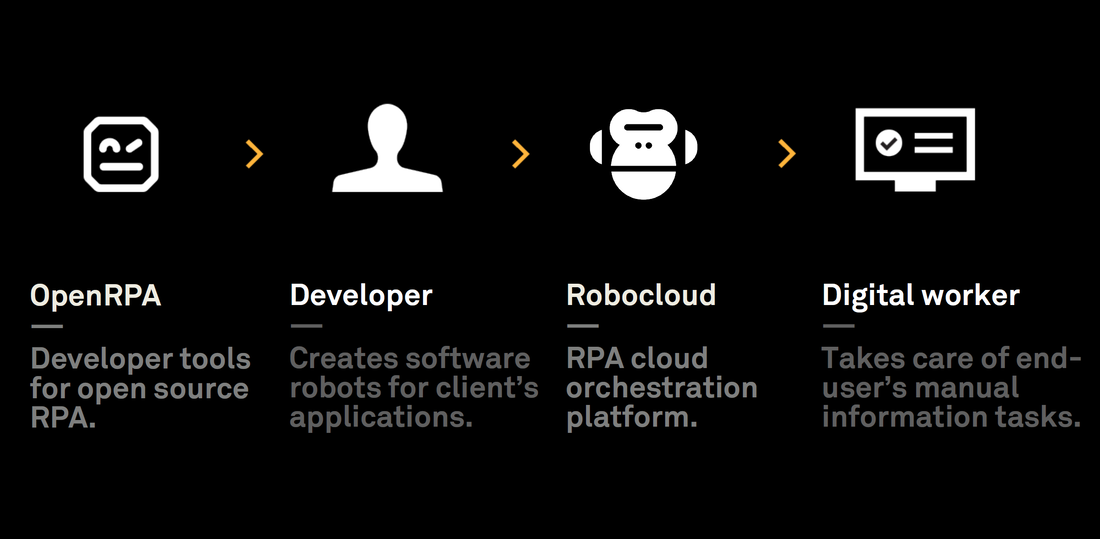|
AI and robots are going to take work from human beings, there is no question about it. The much more complex question, as usual, with new technology, is how exactly it will happen and what is the timetable. We know robots have already taken over some factory work and self-driving cars are coming, but robots are also coming to the office and information work, for example, at JP Morgan, software takes standard legal work from lawyers. But maybe Robot Processing Automation (RPA) and outsourcing office robots is the next big wave to start some real disruption.
RPA is already a two-billion-dollar plus global market and is expected to double in three years. RPA is the technology that allows us to build computer software (“robot”) to emulate the actions of a human interacting with computer systems. RPA robots utilize the user interface to capture data and manipulate applications just like humans do. Basically, it means software uses systems as a human being and can also process data between systems. In practice, it can be simple data transfer from legacy systems to some new system, or from Excel to SAP, but it can be also handle much more complex processes such as insurance claims. At the moment the RPA market is dominated by a few big software companies and system integrators that manage implementations. To get to the next level, it needs lower license fees for robots, but also making the actual implementation easier. Easier implementation doesn’t mean only easier tools to make simple tasks, but also more powerful tools to make much more advanced robots that can handle much more demanding jobs, even including AI. A potential business model is to start to offer outsourcing services done by software robots. Business Process Outsourcing market is expected to be a $343 billion market by 2025. We can say it is almost 100 times the current RPA market. Nowadays RPA is mainly used in larger corporations that want to cut routine work. They make their internal calculations; how much human work must be replaced that they have a business case. Then they approach a larger IT consulting or System Integrator firms and buy an implementation project from them on RPA software. Then they pay license fees to RPA software vendors. The license fees are quite high, so it must be significant savings in the human work that this implementation project and software fees are really justified. At the same time some companies have hundreds of other tasks that could be automated. And there are also thousands or hundreds of thousands of smaller companies that also must perform a lot of routine work. Let’s think, for example, smaller accounting firms. Their employees use a lot of time copy-pasting information between invoicing, payroll, reporting and accounting systems. Sometimes they build some of their own ‘macros’, but in the most cases it is too complex and they have no time to optimize existing systems and processes. They probably can’t really justify a business case to use the current RPA software solutions. Let’s then think, if they could easily take a cloud-based robot that starts to handle routine tasks between an invoicing and accounting system. A small company could order a robot online for its specific needs and we had cloud-based solutions where hundreds of thousands of developers could develop and offer their robots to companies of any size. It would be easy and safe to start to use those robots for daily office routines. This would really change the office work and the role of robots in information work. Then it would be easy to build more complex functionality, including AI, into those robots and to get them to execute more and more complex tasks. We are already seeing all kinds of physical robots. There are industrial robots for manufacturing, waste-processing and transporting items. We also have cleaning robots in homes and self-driving cars. It’s somehow surprising that software robots for office work are still so complex to build and so expensive. It is clear, however, that this is going to change. Today the RPA market is like any boring B2B software market. As we know, big changes are not really implemented by selling software in a traditional way to companies, especially when the targets are mainly larger companies that are conservative, procurement channels are ultra-conservative and both are influenced by opportunistic IT consulting firms. It is very evident that software robots will, at some point, be found each and every office. The question is now, how and when it will happen. A strong candidate is to have platforms that easily build and enable robots and offer them for outsourcing work. When it starts to happen in a big way, no office will stay the same. Maybe this is one new area where Silicon Valley and China could start to put money to work? The article first appeared on Disruptive.Asia. Read more about Robocorp, the leading cloud-based open source software robotics company. Prifina has been taken position 21 on AngelList's 32 Fastest Growing Startups In San Francisco - Hiring Now - List. AngelList looked through their data to find which companies have added the most employees in 2019, and we selected the leading startups that also have open jobs. They removed any company that didn't include salary/equity data for its jobs. The list includes also companies like Roblox, BlackBird, Truly, and Looker.
Prifina offers tools, including personal concierge and AI, and services to manage private data in the digital world. Prifina believes that people must be able to own their own data and have solutions to manage, control and utilize their data. Personal data is fundamental a part of personal wealth. Personal data is a part of personal life. Personal data influences personal life and personal data can have an eternal life. Prifina believes it should be in your personal control and your personal AI will serve you. It has been a great privilege for Prifina to be invited to attend the largest family office meeting in Monaco. The Ritossa Family Office Investment Summit took place on June 18–20, 2019. A number of honorable members attended this event: His Highness Prince Albert II of Monaco, Sheik Abdulrhman Abuhaimin from Kingdom of Saudi Arabia, H.R.H. Prince Michel de Yougoslavie, and more than six hundred representatives of family offices, prominent conglomerate business owners, royal family members, private investment companies and industry professionals. Ritossa Family Summit is the largest gathering of family wealth in the world with $4+ trillion of wealth represented at the Summit. The organizers, Ritossa Family Office, is a family business dating back 600 years to the time of the Venetian Empire in Europe. During the two days of the Summit, Prifina team was fortunate to engage in numerous private conversations, network with industry leaders and technology visionaries. We were delighted to share our cross-border thought leadership about the future of data and management of private finances. Prifina’s team also participated in panel discussions about the practical aspects related to FinTech and offering financial services in the digital environment. Prifina’s CEO Markus Lampinen was also invited for an interview with CNBC where he explained the vision and of Prifina and how new data management tools are going to emerge in the forthcoming years. Here is the full interview: Robocorp has launched the first pilots of the Robocloud orchestration platform. The world's first cloud-native RPA orchestrator is designed to be a cost-effective, secure, fast, and scalable way to adopt and grow enterprise-level software robotics that has is built with open-source tools.
Robocloud is a subscription-based cloud platform that enables secure deployment and orchestration of robotic process automation workers with minimum overhead. Robocloud’s technology allows creating a scalable RPA infrastructure for an organization within minutes. Robocloud has a flat monthly rate, which is significantly lower than any current competing solution on the market. The ten pilot partners are leading consulting and system integrator companies that especially focus on offering top-level solutions for robotic process automation. The partners plan to develop solutions, for example, to finance, transportation, and logistics companies. Partner feedback is used to guide product development and prepare for the 2020 public product launch. Robocorp is set out to change robotic process automation. RPA has the potential to change how millions of people work every day, and Robocorp is making it accessible to everyone through license-free open-source technologies and cloud delivery. More information Antti Karjalainen, CEO [email protected] |
AboutEst. 2009 Grow VC Group is building truly global digital businesses. The focus is especially on digitization, data and fintech services. We have very hands-on approach to build businesses and we always want to make them global, scale-up and have the real entrepreneurial spirit. Download
Research Report 1/2018: Distributed Technologies - Changing Finance and the Internet Research Report 1/2017: Machines, Asia And Fintech: Rise of Globalization and Protectionism as a Consequence Fintech Hybrid Finance Whitepaper Fintech And Digital Finance Insight & Vision Whitepaper Learn More About Our Companies: Archives
January 2023
Categories |






 RSS Feed
RSS Feed
